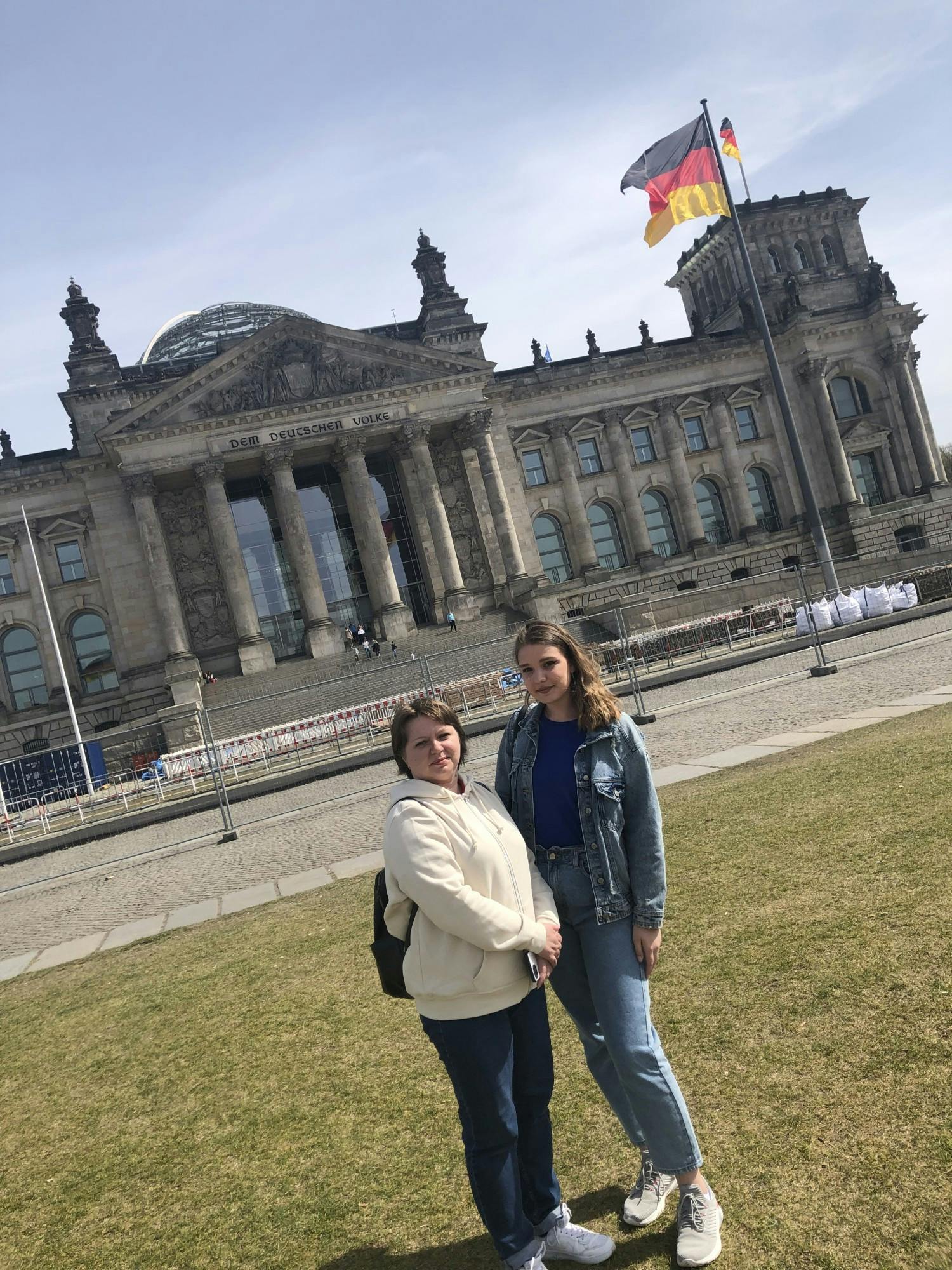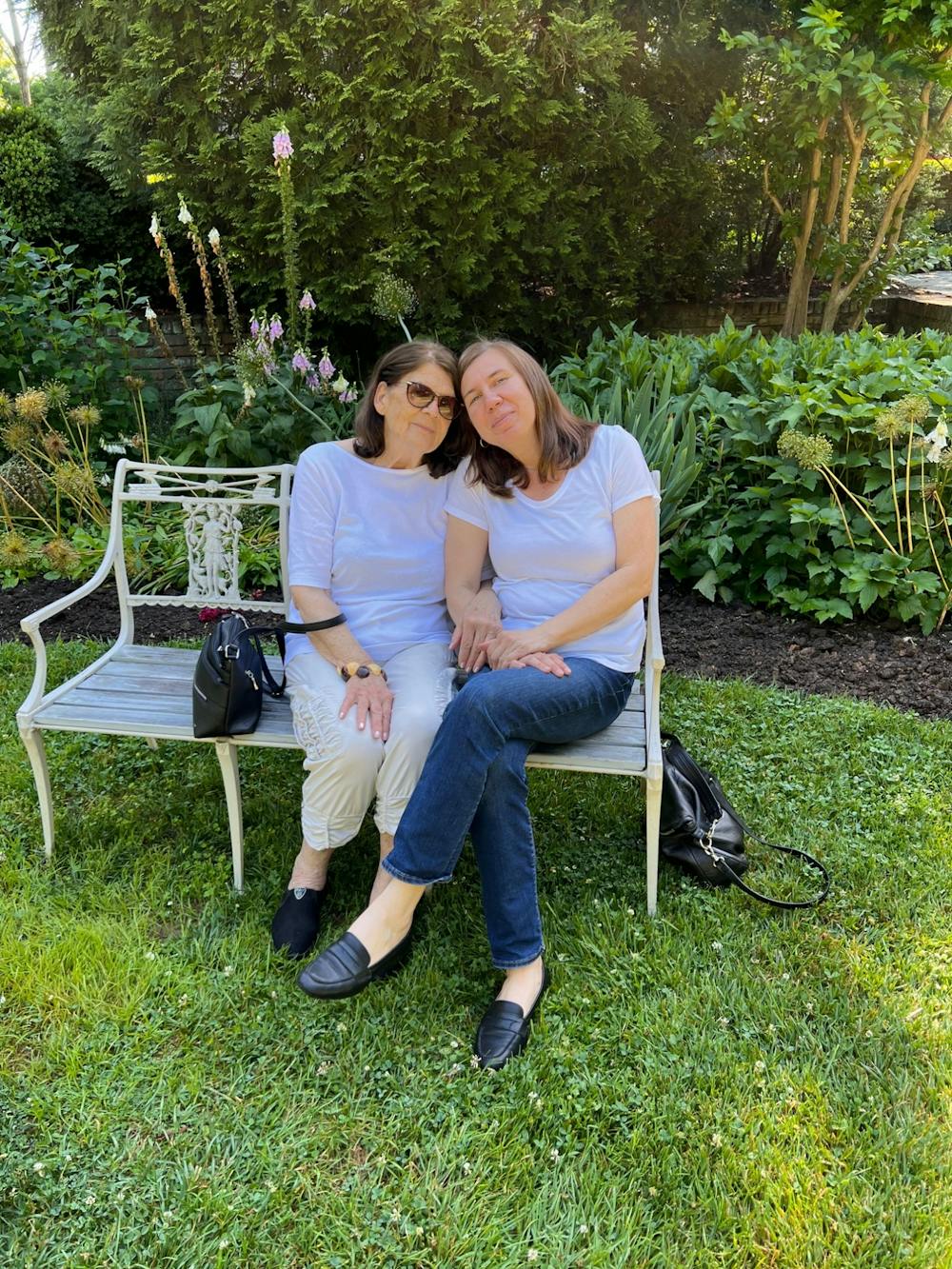Daria Poprotska abruptly woke up at 5 a.m. to the deafening sounds of explosions. It was February 2022, and although she wasn’t expecting the bombs, it wasn’t an unfamiliar sound.
The sound brought her back to 2014 when Russian forces invaded the Donetsk region of Ukraine. She immediately checked her phone and realized this time, it wasn’t just Donetsk, but the entire country that was under attack.
Because her family experienced similar attacks eight years ago and her father is in the Ukrainian military, Poprotska and her parents stayed in their hometown Sloviansk in the Donetsk region instead of evacuating.
“[We thought] maybe it will go away, or it will be resolved in a peaceful manner, but then we waited the whole month of March and then April, and I said to my mom that I can’t do it anymore,” Poprotska said.
Around the same time — but halfway around the world — Liza Skryzhevska, a resident in Oxford, Ohio, decided to bring her mother to the U.S. from Odesa, Ukraine. Skryzhevska, who was born and raised in Odesa, was concerned for her mother’s safety as the Russian-Ukrainian war broke out around her.
“She was 83 at that time, and we decided to bring her here,” Skryzhevska said.
In February 2022, Russia’s president Vladimir Putin launched a country-wide invasion of Russian forces into Ukraine. War broke out across the country. Torn-apart families, fleeing refugees and destroyed infrastructure were just some of the resulting effects.
One year later, not much has changed. According to a report published by the United Nations (U.N.), 14 million people have been displaced from their homes in Ukraine and more than 8,000 civilians have been killed.
Stephen Norris, a professor of Russian history and director of the Havighurst Center for Russian and Post-Soviet Studies at Miami University, said he doesn’t see the war ending soon.
“Putin’s justification is it’s almost like a war for Russian civilization to survive, which is a very stark, existential term,” Norris said. “I don’t know how he can get out of [the war] when he’s pitched it in this way that you almost have to change the very regime of Ukraine, you have to change the nature of the Ukrainian state today in order for Russia to claim victory.”
In April 2022, Poprotska convinced her mother to seek safety in Germany, so they took an evacuation train out of Kramatorsk. The train ride took 30 hours to get from Ukraine to Germany.
“There were so many people who were evacuating,” Poprotska said. “There wasn’t even enough space to sleep.”
Enjoy what you're reading?
Signup for our newsletter
On April 8, 2022, two Russian rockets bombed the train station and killed more than 50 people.
“The realization that we were standing in the same train station and trying to evacuate was just too much to handle,” Poprotska said.

Daria Poprotska currently lives in Oxford and her mother lives in Germany after they evacuated Ukraine in April 2022.
Meanwhile, Skryzhevska was considering the safest way to get her mother out of the country. She thought about going through Romania or Poland but decided the safest route was for her mother to go through Moldova.
Skryzhevska and her daughter rented an Airbnb in Frankfurt, Germany, and connected with friends of friends who stayed in Ukraine to get her mother to Chișinău, the capital of Moldova, where the nearest operating airport was.
Skryzhevska and her daughter stayed in Frankfurt for three weeks while her mother went through the immigration process in Germany because all the U.S. embassies in Kyiv were shut down.
“The U.S. government was very efficient at that time because they realized that many people who lived there would like to reunite with their families,” Skryzhevska said. “So I was able to do all the paperwork required in a couple of months, while under different circumstances, it would take more than a year.”
When Skryzhevska was a graduate student at Odessa National University, she participated in a Junior Faculty Exchange Program in the U.S. and studied geographic information systems for one year at the University of Idaho in 2000.
When she finished her graduate degree, Skryzhevska got offered a teaching position in the geography department at Miami in 2007. Now, she’s an associate dean for academic affairs for the College of Liberal Arts and Applied Science at Miami's Hamilton campus.
Since Skryzhevska is a U.S. citizen, she could bring her mother over through the U.N.’s Family Reunification Program.
“Thinking back, I don’t want to repeat that experience ever,” Skryzhevska said. “It was very difficult. I was very worried. The last time my mother was on a flight before that was 40 years ago.”
Poprotska's journey to the U.S. was similar to Skryzhevska's. She finished her bachelor’s degree at Donbas State Pedagogical University in Ukraine and applied to master's programs in Europe and the U.S. She chose Miami when she discovered it offered graduate assistant positions that would help cover the cost of tuition. Now, Poprotska is in her first year as a graduate student studying English language arts.
Despite busying herself with schoolwork, Poprotska said it’s difficult to be a full-time student while hearing the stories coming out of Ukraine, not knowing if her family is safe. Poprotska hasn’t seen her grandmother, who lives in Donetsk, in four years.
“Sometimes they don’t have service or anything, and it’s torture to not call her every day and find out if she is alive and everything is okay because there are still explosions there every day,” Poprotska said.
Her father is still in Sloviansk fighting in the Ukrainian military, and her mother is living with a host family in Germany.
“My heart just breaks every time because I’ve always been with my family,” Poprotska said. “Every holiday we were together, and I could just see them every time I wanted, and now I cannot even call them and hear their voices.”
Skryzhevska said her mother is also homesick and wants to return to Ukraine.
“Every single day, she tells me she wants to go back,” Skryzhevska said. “Her life here is good. She’s safe. She has everything she needs … but still, every day she remembers her home where she lived most of her life, and she tells me that she wants to go home.”
Norris said, despite the tragic stories coming out of Ukraine, it is somewhat hopeful that the war is continuing one year later.
“In some ways, it’s oddly more optimistic that we’re sitting here [a year later] because I think most of us who study this part of the world feared a Russian victory,” Norris said. “But a year later, what we’re talking about now is, in some ways, the success of Ukraine.”
Skryzhevska agreed with Norris and said what has inspired her over the past year is the resilience of the Ukrainian people.
“What’s stuck with me is how people are taking it,” Skryzhevska said. “Despite those difficulties, despite all the hardships, they are so determined to win and bring peace back to Ukraine.”




